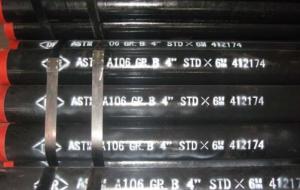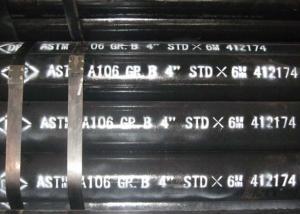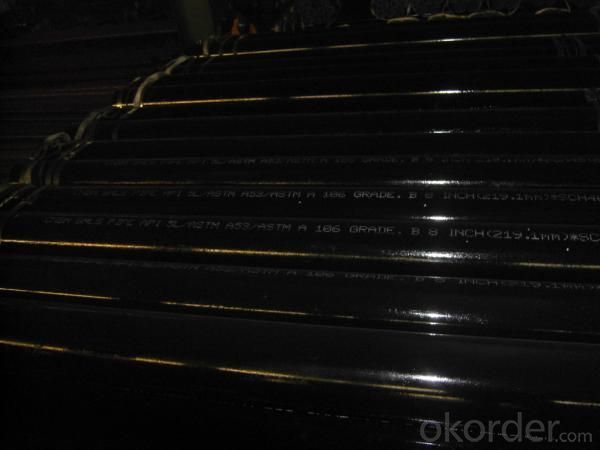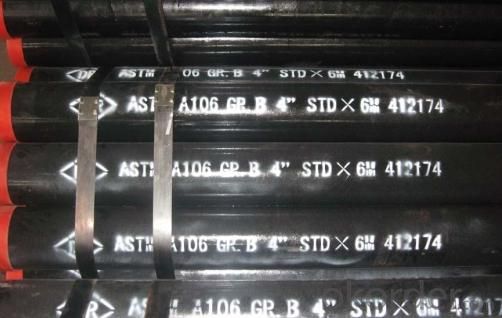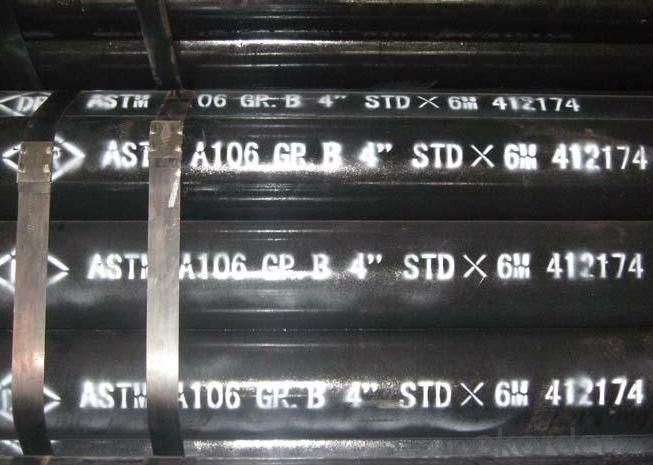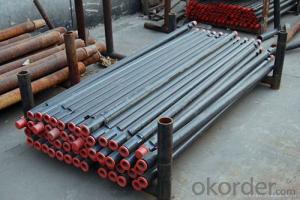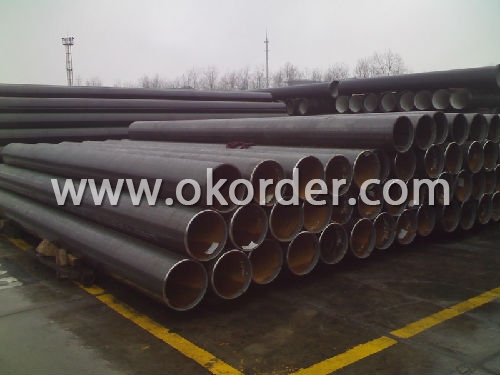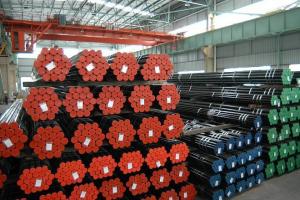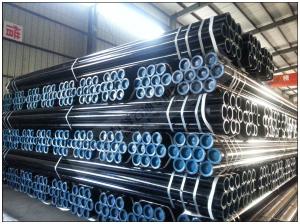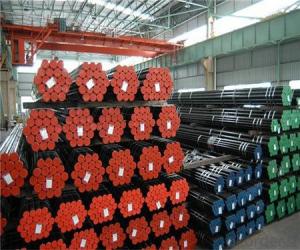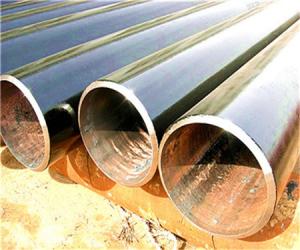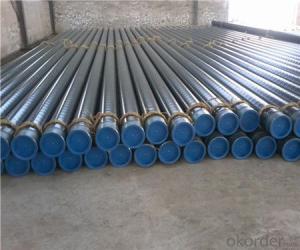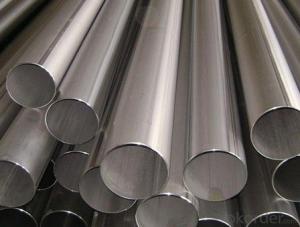API 5L Seamless line Pipe J55
- Loading Port:
- China Main Port
- Payment Terms:
- TT or LC
- Min Order Qty:
- 50MT m.t.
- Supply Capability:
- 5000 Tons Per Month m.t./month
OKorder Service Pledge
OKorder Financial Service
You Might Also Like
| |||||||||||||||||||||||||||||||||||||||||||||||||||||||||||||||||||||||||||||||||||||||||||||||||||||
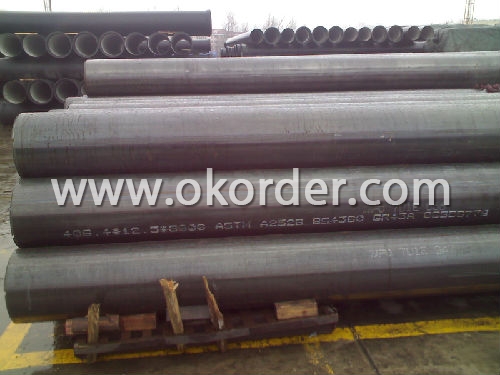 |
- Q: Can steel pipes be used for plumbing?
- Yes, steel pipes can be used for plumbing. They are commonly used in commercial and industrial applications due to their durability and strength. However, they are less common in residential plumbing due to their higher cost and the availability of alternative materials such as copper and PVC.
- Q: Are steel pipes resistant to electromagnetic interference?
- Yes, steel pipes are generally resistant to electromagnetic interference due to their conductivity and ability to act as a shield against electromagnetic fields.
- Q: What are the different methods of joining steel pipes for steam applications?
- Some common methods of joining steel pipes for steam applications include welding, threading, and flanging. Welding involves melting and fusing the pipes together, creating a strong and permanent connection. Threading involves cutting grooves into the ends of the pipes and screwing them together using threaded fittings. Flanging involves using a flange to connect the pipes, which is then bolted together for a secure and leak-free connection. Each method has its own advantages and considerations depending on the specific application and requirements.
- Q: What is the difference between hot-rolled and cold-rolled steel pipes?
- Hot-rolled steel pipes are produced at high temperatures and have a rougher surface finish. They are known for their flexibility and are often used in applications that require bending or shaping. On the other hand, cold-rolled steel pipes are produced at lower temperatures and undergo additional processing to achieve a smoother surface finish. They are generally stronger and more precise in dimensions, making them suitable for applications that require high precision and strength.
- Q: How are steel pipes measured?
- Steel pipes are typically measured by their outer diameter (OD) and wall thickness. The OD is measured using a caliper or tape measure, while the wall thickness is determined using a specialized instrument called a micrometer. These measurements are crucial in determining the size and strength of steel pipes for various applications.
- Q: Can steel pipes be used for underground fuel storage tanks?
- Yes, steel pipes can be used for underground fuel storage tanks. Steel pipes are commonly used for underground fuel storage tanks due to their durability, strength, and resistance to corrosion. They can effectively contain and protect fuel while being buried underground.
- Q: Can steel pipes be used for signposts or street lighting poles?
- Yes, steel pipes can be used for signposts or street lighting poles. Steel is a strong and durable material that can withstand outdoor conditions and support the weight of signs or lighting fixtures. It is commonly used in construction for such purposes due to its strength and longevity.
- Q: What are the advantages of using stainless steel pipes?
- There are several advantages of using stainless steel pipes. Firstly, stainless steel is highly resistant to corrosion, making it suitable for various applications where exposure to moisture or harsh environments is a concern. Secondly, stainless steel pipes have excellent strength and durability, allowing them to withstand high pressures and temperature fluctuations. Additionally, stainless steel is hygienic and easy to clean, making it ideal for applications in the food and beverage industry. Lastly, stainless steel pipes are aesthetically pleasing and can be easily integrated into different architectural designs.
- Q: How are steel pipes made?
- Steel pipes are made through a process called pipe manufacturing, which involves multiple steps. Firstly, raw steel is melted in a furnace and then subjected to continuous casting to form a solid billet. This billet is then heated and pierced to create a hollow tube called a shell. Next, the shell is rolled and stretched to the desired diameter and thickness using a series of rollers. The pipe is then subjected to a process called welding, where two edges of the shell are fused together to create a seamless or welded pipe. Finally, the pipe undergoes various finishing processes such as cutting, straightening, and inspection before being ready for use.
- Q: How are steel pipes used in the manufacturing of power distribution systems?
- Steel pipes are commonly used in the manufacturing of power distribution systems as they provide a reliable and durable solution for transporting and protecting electrical cables. They are used to create conduits that house the cables, ensuring safe and efficient transmission of electricity throughout the system. Steel pipes also offer resistance to corrosion, fire, and extreme weather conditions, making them a suitable choice for power distribution systems.
1. Manufacturer Overview
| Location | Hebei, China |
| Year Established | 1990 |
| Annual Output Value | Above 30 milionrmb |
| Main Markets | Germany; Japan;Korea; America; Brasil; Canada |
| Company Certifications | ISO9001:2000 ; API |
2. Manufacturer Certificates
| a) Certification Name | |
| Range | |
| Reference | |
| Validity Period |
3. Manufacturer Capability
| a) Trade Capacity | |
| Nearest Port | Tianjin; Qingdao |
| Export Percentage | 50% |
| No.of Employees in Trade Department | Above 10 |
| Language Spoken: | English; Chinese |
| b) Factory Information | |
| Factory Size: | 8,5000square meters |
| No. of Production Lines | Above 10 |
| Contract Manufacturing | OEM Service Offered; Design Service Offered |
| Product Price Range | High Average |
Send your message to us
API 5L Seamless line Pipe J55
- Loading Port:
- China Main Port
- Payment Terms:
- TT or LC
- Min Order Qty:
- 50MT m.t.
- Supply Capability:
- 5000 Tons Per Month m.t./month
OKorder Service Pledge
OKorder Financial Service
Similar products
Hot products
Hot Searches
Related keywords

